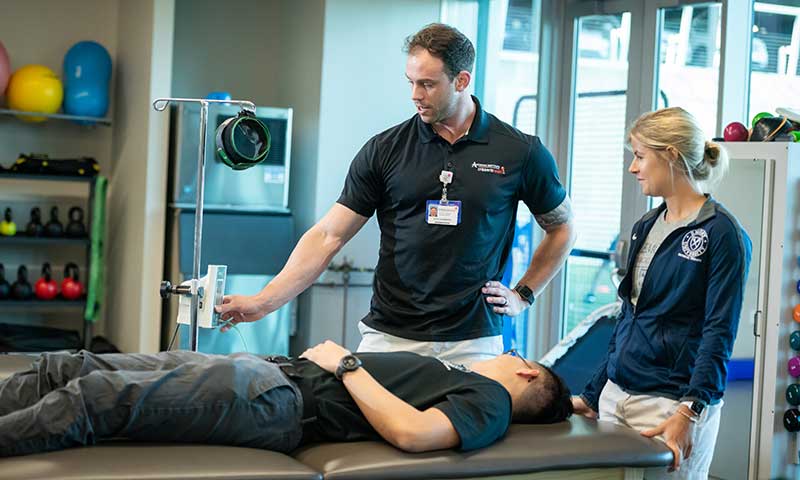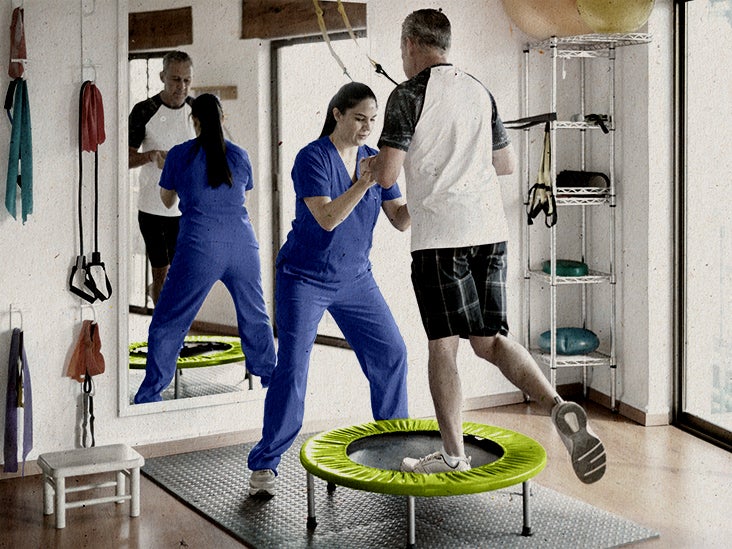Recognizing the Function of Physical Specialists in Sports Medicine
Comprehending the role of physical therapists in sporting activities medicine is vital for professional athletes and healthcare professionals alike. Physical therapists play a vital role in assessing athletes' injuries and conditions, establishing individualized treatment strategies, and implementing rehab methods. Collaborating with health care specialists and trains, physical therapists offer thorough care to professional athletes, guaranteeing their total well-being and optimal efficiency.

Examining Professional athlete's Injuries and Issues
Physical therapists in sporting activities medicine play an important role in examining professional athletes' injuries and problems. The capability to precisely evaluate an athlete's injury is vital in establishing the appropriate training course of treatment and recovery.
Throughout the evaluation, physiotherapists gather essential info such as the athlete's medical background, previous injuries, and existing symptoms. They also carry out an extensive physical exam, examining aspects such as array of movement, stamina, security, and versatility (physical therapist Roanoke). Unique diagnostic tests and imaging may additionally be made use of to additional review the injury or problem
By performing this detailed evaluation, physical specialists are able to properly diagnose the injury and develop a customized treatment strategy. This might include therapeutic exercises, hands-on treatment methods, and methods such as warm or chilly therapy. Furthermore, physical specialists provide education and learning and guidance on proper techniques for preventing future injuries, as well as approaches for enhancing efficiency and decreasing the threat of re-injury.
Developing Individualized Therapy Plans
Physiotherapists in sports medication establish customized therapy strategies based upon their comprehensive analysis of an athlete's injuries and problems. This procedure includes a detailed understanding of the athlete's clinical background, physical evaluation, and diagnostic examinations. By gathering this info, the physical therapist can identify the underlying sources of the injury or problem and determine the most proper training course of therapy.
The individualized therapy plan aims to deal with the particular demands of the athlete and advertise ideal healing. It may consist of a mix of therapeutic exercises, manual treatment strategies, modalities such as warm or cool therapy, and education and learning on injury prevention. The physiotherapist will additionally take into consideration the professional athlete's goals, sport-specific needs, and timeline for go back to play when developing the therapy strategy.
Furthermore, the therapy plan may progress gradually as the professional athlete proceeds in their recovery. Regular re-evaluations allow the physiotherapist to examine the performance of the treatments and make any kind of essential adjustments. The best goal is to help with the athlete's risk-free return to their sport while decreasing the threat of re-injury.
Implementing Recovery Strategies
The application of recovery methods plays an essential role in the therapy procedure for professional athletes in sports medicine. These techniques are developed to aid professional athletes recuperate from injuries, enhance their performance, and avoid further injury. Physiotherapists, as professionals in activity and function, are in charge of applying these methods and assisting professional athletes through their rehabilitation journey.
One of the vital aspects of executing rehabilitation methods is the evaluation of the athlete's condition. Physiotherapists assess the professional athlete's injury or condition, considering elements such as the extent of the injury, the athlete's goals, and their current level of physical health and fitness. Based upon this evaluation, the therapist develops a customized therapy strategy that consists of specific rehabilitation techniques.
Recovery methods can include a range of treatments such as therapeutic workouts, hand-operated treatment, techniques (e.g., warmth, cold, electrical excitement), and practical training. These techniques are tailored to resolve the athlete's particular demands and objectives, intending to restore optimum function, decrease pain, and improve efficiency.
Throughout the rehab process, physical therapists very closely keep an eye on the professional athlete's development and make any kind of needed modifications to the treatment plan. They likewise give education and advice to the professional athlete on correct kind, injury prevention techniques, and self-care strategies.
Enhancing Efficiency and Preventing Injuries
An essential element of the physiotherapist's duty in sporting activities medication is enhancing performance and avoiding injuries via targeted treatments. Physiotherapists play a crucial function in optimizing professional athletes' performance and decreasing the threat of injuries by employing numerous techniques and methods.
To enhance efficiency, physiotherapists work closely with athletes to establish personalized workout programs that focus on boosting strength, endurance, adaptability, and equilibrium. orthopedics Roanoke. These programs are created to deal with details locations of weak point or limitation, allowing professional athletes to reach their full potential. Furthermore, physical specialists might utilize techniques such as hand-operated treatment, including joint mobilization and soft cells mobilization, to optimize professional athletes' movement patterns and improve overall performance

Collaborating With Health Care Professionals and Coaches
Cooperation with health care specialists and coaches is essential for physical therapists in enhancing athlete performance and stopping injuries in the area of sports medicine. Roanoke physical therapy. Physical specialists play a vital role in the multidisciplinary group that supports professional athletes, and efficient cooperation with various other experts is important for delivering detailed treatment
When collaborating with health care professionals, physiotherapists team up very closely with doctors, orthopedic doctors, and sports medication professionals. This partnership allows for far better diagnosis, evaluation, and treatment planning for professional athletes. By sharing their know-how and expertise, physiotherapists can contribute valuable insights and viewpoints to the from this source group, ensuring the very best feasible end results for professional athletes.
Additionally, collaboration with trainers is essential for physical therapists to create and execute efficient training and conditioning programs. Trainers offer useful details regarding the details needs and goals of the sport, in addition to the athlete's training routine and efficiency expectations. By collaborating, physical specialists and trainers can develop customized programs that resolve the professional athlete's private demands and enhance their efficiency while lessening the risk of injury.
Additionally, cooperation with healthcare specialists and trains expands beyond the therapy and training stage. Physical specialists usually function very closely with these specialists in developing injury prevention techniques and procedures. By sharing their knowledge and understanding, they can add to the growth of evidence-based practices that intend to reduce the incident of injuries and make best use of athlete performance.
Verdict
To conclude, physical specialists play a vital role in sports medication by examining athletes' problems and injuries, creating tailored therapy plans, applying rehabilitation methods, boosting efficiency, and preventing injuries. They likewise collaborate with medical care professionals and trains to ensure comprehensive take care of athletes. Their proficiency and expertise contribute dramatically to the overall health and wellness and well-being of professional athletes in the field of sports medicine.
Physical therapists play a vital duty in reviewing athletes' conditions and injuries, developing individualized treatment plans, and executing rehabilitation strategies. Physical specialists assess the professional athlete's injury or condition, reference taking into account elements such as the extent of the injury, the professional athlete's objectives, and their existing level of physical fitness.In terms of injury prevention, physical therapists use their understanding of biomechanics and activity analysis to recognize possible risk aspects that may incline professional athletes to injuries. Physical specialists inform professional athletes on proper warm-up and cool-down techniques, proper shoes, and injury avoidance strategies, encouraging them to take an active duty in protecting against injuries.
In verdict, physical therapists play an important function in sports medicine by reviewing professional athletes' conditions and injuries, creating individualized treatment strategies, executing rehab methods, boosting performance, and stopping injuries.